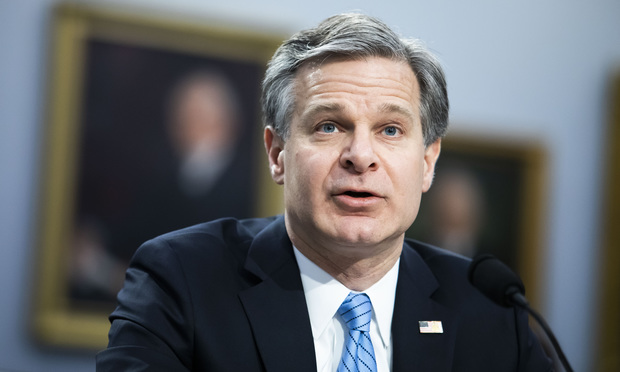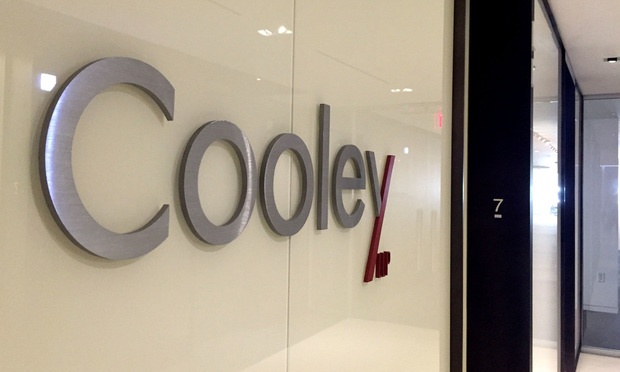King & Spalding Resists WhatsApp's 'Drastic' Disqualification Bid in Cyber Case
A team from King & Spalding, including former partner and now FBI Director Christopher Wray, provided legal services to WhatsApp in a sealed matter four years ago. WhatsApp's counsel at Cooley says the firm acquired confidential information relevant to a pending case where King & Spalding represents a WhatsApp adversary.
May 30, 2020 at 08:51 AM
6 minute read
 FBI Director Christopher Wray testifies before the House Appropriations Committee in 2019. (Photo: Diego M. Radzinschi / ALM)
FBI Director Christopher Wray testifies before the House Appropriations Committee in 2019. (Photo: Diego M. Radzinschi / ALM)
King & Spalding's prior legal work for WhatsApp Inc. should not disqualify the firm from representing an adversary that was sued by the popular text messaging service in California federal court, lawyers for the firm told a judge Friday.
WhatsApp, represented by Cooley LLP, sued King & Spalding client NSO Group Technologies last year over claims the Israeli cybertechnology company exploited the messaging platform in an effort to gain unauthorized access to user communication. NSO has denied the allegations.
WhatsApp's lawyers contend King & Spalding's work for the company in a sealed matter four years ago has given the firm an unfair advantage in the pending case in Oakland's federal trial court. The Cooley lawyers argued in their disqualification papers that the lawsuit against NSO is substantially related to the earlier sealed matter and that King & Spalding acquired confidential information material to the pending litigation.
On Friday, King & Spalding's lawyers at Long & Levit disputed that the two cases are related, and they argued that three of the four King & Spalding lawyers who worked on the earlier sealed matter are no longer at the law firm. One of those attorneys, Christopher Wray, a former white-collar partner, was confirmed in 2017 as the FBI director.
"Disqualification is a drastic, disfavored and disruptive remedy that is unwarranted here," San Francisco lawyer Jessica MacGregor of Long & Levit said in the new court filing. MacGregor argued that "depriving NSO of highly skilled counsel of its choice will impose significant hardship and prejudice."
New filings in the case in April led to widespread public attention that contrasted Wray's advocacy for WhatsApp as a private lawyer and his statements as FBI director questioning technological barriers that can impede law enforcement investigations.
Indeed, FBI and Justice Department leaders have long clashed with Silicon Valley over encryption.
"Like all other lawyers, [Wray's] duty of loyalty was to his client, and he did not put his personal views ahead of his clients' interests or allow them to affect the legal work he did for clients," the FBI said in a statement in April, according to The Wall Street Journal. "Today, as director of the FBI, his duty is to act in the best interests of the American people."
Wray had been a partner at King & Spalding for 12 years before he left the firm to join the Trump administration in 2017. He reported earning more than $14 million from the firm in the years leading up to his departure, according to financial disclosure filings that are mandatory for many senior-level executive branch employees. His clients included Credit Suisse Group, Johnson & Johnson, Wells Fargo and Chevron, the disclosures showed. He declined to identify three confidential clients who at the time were subject to nonpublic investigations.
 Cooley offices in Washington, D.C. (Photo: Diego M. Radzinschi/ALM)
Cooley offices in Washington, D.C. (Photo: Diego M. Radzinschi/ALM)Cooley lawyers representing WhatsApp assert that King & Spalding acquired information about confidential aspects of the messaging service's platforms when the firm provided legal advice to the company in 2015 and 2016.
The current case "involves the very technology that WhatsApp previously hired King & Spalding to analyze and protect," the Cooley lawyers said.
"King & Spalding is violating a bedrock requirement of attorney loyalty: the duty to avoid switching sides and opposing a client that it once represented," Cooley partner Michael Rhodes said in a filing in April.
Rhodes said in the filing: "Put simply, no client would ever expect to reveal the proprietary and nonpublic details of its product to its lawyers, only to find those lawyers acting adversely to it a few years later on a case involving the same technology and on behalf of a client that marketed and sold the ability to attack and exploit its network."
King & Spalding billed WhatsApp about 94 hours of work on the sealed matter, Long & Levit's MacGregor said in Friday's filing. Wray worked for WhatsApp with King & Spalding lawyers Paul Mezzina, Nick Oldham and Cathy O'Neil, who has since died. Oldham left the firm in 2017 and now serves as the chief privacy and data governance officer at Equifax. Mezzina rejoined the firm earlier this year after clerking for Justice Neil Gorsuch on the U.S. Supreme Court.
NSO retained King & Spalding after a three-month search for a firm to defend the company against WhatsApp's claims. The company said it sought a firm with a bench in cybersecurity, government relations and national security, according to court records. Many firms, MacGregor said, faced conflicts based on work for Facebook, which owns WhatsApp.
"Forcing a change in counsel will send NSO back into a diminished legal marketplace dominated by Facebook," MacGregor wrote. "NSO will also lose the benefit of the significant work K&S has already performed and would have to shoulder the increased expense of beginning anew with replacement counsel."
Read more:
Judge Won't 'Destroy' King & Spalding Billing Records the Firm Wants to Pull Back
FBI Chief of Staff's King & Spalding Income Revealed in New Disclosure
3-Time Supreme Court Justice Clerk Talks About His Different Experiences
FBI Director Wray Banked $14M From King & Spalding Since 2016
Sally Yates Launches Investigations Practice as King & Spalding Partner
This content has been archived. It is available through our partners, LexisNexis® and Bloomberg Law.
To view this content, please continue to their sites.
Not a Lexis Subscriber?
Subscribe Now
Not a Bloomberg Law Subscriber?
Subscribe Now
NOT FOR REPRINT
© 2025 ALM Global, LLC, All Rights Reserved. Request academic re-use from www.copyright.com. All other uses, submit a request to [email protected]. For more information visit Asset & Logo Licensing.
You Might Like
View All
Willkie Farr & Gallagher Drives Legal Challenge for Uber Against State's Rideshare Laws
5 minute read

Report: US Attorney E. Martin Estrada to Resign From California's Central District
3 minute read
After Solving Problems for Presidents, Ron Klain Now Applying Legal Prowess to Helping Airbnb Overturn NYC Ban
7 minute readLaw Firms Mentioned
Trending Stories
- 1Contract Technology Provider LegalOn Launches AI-powered Playbook Tool
- 2Court of Appeals Provides Comfort to Land Use Litigants Through the Relation Back Doctrine
- 3Amid the Tragedy of the L.A. Fires, a Lesson on the Value of Good Neighbors
- 4Democracy in Focus: New York State Court of Appeals Year in Review
- 5In Vape Case, A Debate Over Forum Shopping
Who Got The Work
J. Brugh Lower of Gibbons has entered an appearance for industrial equipment supplier Devco Corporation in a pending trademark infringement lawsuit. The suit, accusing the defendant of selling knock-off Graco products, was filed Dec. 18 in New Jersey District Court by Rivkin Radler on behalf of Graco Inc. and Graco Minnesota. The case, assigned to U.S. District Judge Zahid N. Quraishi, is 3:24-cv-11294, Graco Inc. et al v. Devco Corporation.
Who Got The Work
Rebecca Maller-Stein and Kent A. Yalowitz of Arnold & Porter Kaye Scholer have entered their appearances for Hanaco Venture Capital and its executives, Lior Prosor and David Frankel, in a pending securities lawsuit. The action, filed on Dec. 24 in New York Southern District Court by Zell, Aron & Co. on behalf of Goldeneye Advisors, accuses the defendants of negligently and fraudulently managing the plaintiff's $1 million investment. The case, assigned to U.S. District Judge Vernon S. Broderick, is 1:24-cv-09918, Goldeneye Advisors, LLC v. Hanaco Venture Capital, Ltd. et al.
Who Got The Work
Attorneys from A&O Shearman has stepped in as defense counsel for Toronto-Dominion Bank and other defendants in a pending securities class action. The suit, filed Dec. 11 in New York Southern District Court by Bleichmar Fonti & Auld, accuses the defendants of concealing the bank's 'pervasive' deficiencies in regards to its compliance with the Bank Secrecy Act and the quality of its anti-money laundering controls. The case, assigned to U.S. District Judge Arun Subramanian, is 1:24-cv-09445, Gonzalez v. The Toronto-Dominion Bank et al.
Who Got The Work
Crown Castle International, a Pennsylvania company providing shared communications infrastructure, has turned to Luke D. Wolf of Gordon Rees Scully Mansukhani to fend off a pending breach-of-contract lawsuit. The court action, filed Nov. 25 in Michigan Eastern District Court by Hooper Hathaway PC on behalf of The Town Residences LLC, accuses Crown Castle of failing to transfer approximately $30,000 in utility payments from T-Mobile in breach of a roof-top lease and assignment agreement. The case, assigned to U.S. District Judge Susan K. Declercq, is 2:24-cv-13131, The Town Residences LLC v. T-Mobile US, Inc. et al.
Who Got The Work
Wilfred P. Coronato and Daniel M. Schwartz of McCarter & English have stepped in as defense counsel to Electrolux Home Products Inc. in a pending product liability lawsuit. The court action, filed Nov. 26 in New York Eastern District Court by Poulos Lopiccolo PC and Nagel Rice LLP on behalf of David Stern, alleges that the defendant's refrigerators’ drawers and shelving repeatedly break and fall apart within months after purchase. The case, assigned to U.S. District Judge Joan M. Azrack, is 2:24-cv-08204, Stern v. Electrolux Home Products, Inc.
Featured Firms
Law Offices of Gary Martin Hays & Associates, P.C.
(470) 294-1674
Law Offices of Mark E. Salomone
(857) 444-6468
Smith & Hassler
(713) 739-1250






